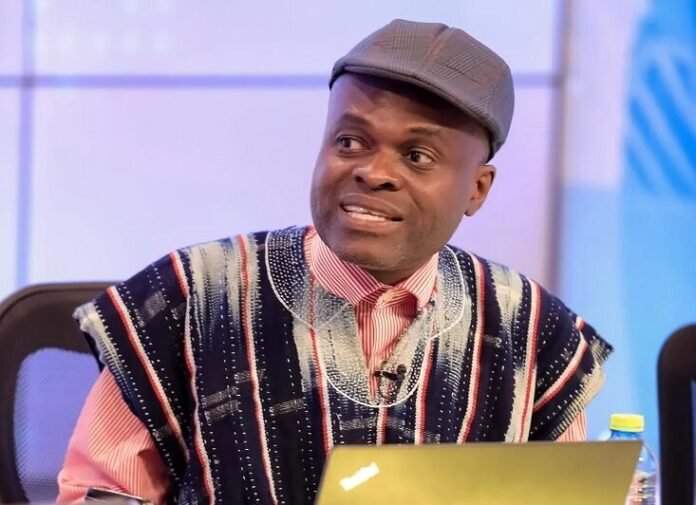Martin Kpebu, a private legal practitioner, has fumed about the continued detention of the Bono Regional Chairman of the New Patriotic Party (NPP), Kwame Baffoe, commonly known as Abronye.
According to Martin Kpebu, the decision for the Court to keep Abronye in police custody for two consecutive weeks over a misdemeanour charge is unlawful.
The private legal practitioner asserted that the NDC must know Ghanaians did not vote for them for this type of unlawful governance.
Speaking on Asempa FM’s Ekosii Sen programme on September 12, 2025, Martin Kpebu stated, “We must let the Attorney-General and IGP Yohuno know that this is not lawful. We didn’t vote for the NDC for this type of governance, and I cannot be part of this type of government”.
Lawyer Kpebu argued that the state must proceed to court while granting Abronye bail if they found the comments to be offensive.
He explained, “If they don’t want to forgive him, they can grant him bail as the case proceeds. When the verdict comes and it is too much, then we can talk about it”.
He cautioned that denying Abronye bail in a misdemeanour case sets a dangerous precedent “If in a misdemeanour case, Abronye cannot secure bail, then it means the verdict on my Kpebu Number 2 case in 2016 is void and useless. As citizens, we must get up and resist this, or else it will lead to tyranny”.
Lawyer Kpebu called on Abronye’s legal team to seek redress at the Human Rights Court.
“This is wrong and a sad day for our democracy. We must all rally support and speak against this because we cannot retrogress as a nation,” Kpebu said.
Also, Social activist Oliver Barker-Vormawor has said Circuit Court Judge Bright Acquah, on the New Patriotic Party (NPP) Bono Regional Chairman, Kwame Baffoe, popularly known as Abronye DC, case is not fit to remain on the bench.
Vormawor highlighted that after reading the reasoning behind the Circuit Court Judge’s continued detention of Abronye, he sincerely believes he is not fit to remain on the bench as a judge.
The private legal practitioner is quoted by GHOne TV to have said, “After reading the reasoning of the Circuit Court Judge[Bright Acquah] on Abronye’s case, I sincerely and honestly believe he is not fit to remain on the bench”.
However, Circuit Court Judge Bright Acquah has explained the reason behind the New Patriotic Party (NPP) Bono Regional Chairman, Kwame Baffoe, popularly known as Abronye DC, being remanded in police custody.
Judge Bright Acquah detailed that while Abronye DC’s charges are misdemeanours, the remarks attributed to him had national security and public order implications.
According to Judge Bright Acquah, under two different regimes, the court has been consistent; he pointed to consistency in past cases under former President Akufo-Addo and President John Mahama.
Judge Bright Acquah explained, “It is always said that all persons are equal, but in practice, it is not so. Courtesy George Orwell in his book Animal Farm, one of the commandments is that all men are equal, but some are more equal than others. Translated into this case, all men are equal, but some are more equal than others”.
According to the Judge, freedom of expression in Ghana must be exercised responsibly, warning that if unchecked, insults could pollute the society and undermine national security.
He explained, “One of the codes of ethics for judges is that their decisions should be consistent. I have a case before me, The Republic v. Raphael Okai Ankrah, who appeared on May 16, 2023. He was an NDC sympathiser who openly insulted then-President Nana Addo Dankwa Akufo-Addo and was given a two-week remand.
Just about two or three weeks ago, another matter came before me, The Republic v. Emmanuel Kwakye, a journalist from Wontumi TV, and he was also remanded for two weeks. So, under two different regimes, the court has been consistent, and the court does not see why it should deviate from that consistency”.
The judge in the Abronye case argued that while criticism of policies is acceptable, direct insults against individuals in authority are not.
He cited Section 96(5)(a) and (c) of the Criminal and Other Offences (Procedure) Act, asserting that bail could be refused if there is a likelihood of the accused repeating the offence or failing to appear in court.

